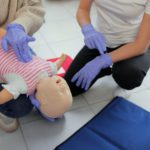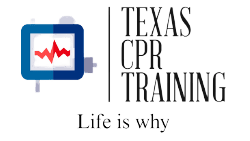
Infant and child choking
If you’ve ever been around an infant or a toddler, you’ve surely noticed their fixation on tasting everything from toys to food to other household items. Choking is the 4th leading cause of unintentional death in children under the age of 5 in the U.S. They are have the highest risk for choking because it take practice to master the art of chewing and swallowing. In addition to their novice eating skills, infants and toddlers have tracheas (wind pipes) roughly the diameter of a drinking straw making it very easy to choke.
Your child is at a higher risk for infant or toddler choking if they have any of the following:
– swallowing disorder
– neuromuscular disorder
– developmental delay
– traumatic brain injury
Infant and Toddler Choking on Food
The most common cause of nonfatal infant and toddler choking is food. Every five days at least one child dies from choking on food in the United States and 12,000 or more children are admitted to an emergency department for food choking related injuries. Thankfully food choking is easy to prevent. Knowing these food facts can prevent infant and toddler choking
– Safely time their introduction to solids
An infant’s digestive system and their motor skills aren’t developed enough to handle solid foods until they are at least 4 months old. At that point their motor skills have reached a point where they can handle soft solids.
– Eat together
Your infant or toddler will eventually reach a point where they can feed themselves, it is important to supervise their mealtimes. You may be feeding them a perfectly portioned plate of food, however distracted eating is a very common cause of infant and toddler choking. Family meals are also a great way to bond while keeping your little one eating safely!
– Recognize high-risk food
Some foods pose more of a risk for choking. Chunky foods can be tough to chew for babies such as hot dogs, grapes, fruit chunks, meat chunks, cheese chunks, and raw veggies. These foods should only be given to small children if they are cut up into very small pieces while under constant supervision. Never give a small child hard foods including popcorn, hard candy, or seeds. You may give your child peanut butter or marshmallows, but keep in mind they are risky.
Infant and Toddler Toy Choking
Kids are curious humans and toys are designed for fun however they are another risk for infant and toddler choking.
– Check the packaging
Age guidelines are essential to detecting the risk of choking. If your child is younger than the outlined age range for a particular toy, hold on to it until they are of age.
– Be vigilant
If your child has older siblings with smaller toys keep them out of your infant or toddler’s reach. Also pay close attention to the quality of their toys. Make sure their toys are in good condition and do not have any small pieces breaking off.
Infant and Toddler Household Item Choking
As adults we don’t think much of tiny items like buttons and coins, but for babies they can be lethal.
Keep these items out of reach:
– pen caps
– buttons
– marbles
– batteries
– magnets
– dice
What to do if Your infant is Choking
If your child is choking and isn’t breathing remain calm and take action.
– Sit down and place your infant face down on your forearm while it rests on your thigh
– Use your palm to firmly and gently thump their back five times
If that doesn’t work:
Move the infant on their back and rest them on your forearm with their head lower than their torso. With two fingers give five rapid chest compressions on the center of their breastbone. If the item does not dislodge continue the chest and back compressions. If they do not start breathing immediately call 911 and begin infant CPR.
Be prepared
As parents and caregivers we do our best to keep our babies safe. Unfortunately infant and toddler choking can happen to us. Taking a CPR certification course is the best gift you can give yourself. You will have peace of mind knowing that you will have the skills to safe your infant’s life.
Choking links:
Take a CPR and First Aid Training Class today with Texas CPR Training
